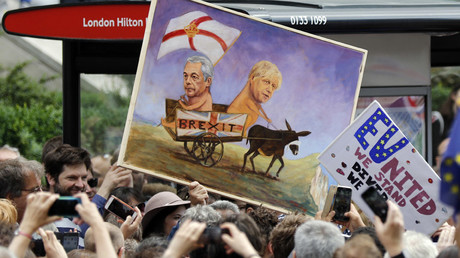Blair tells French media Brits are confused by Brexit, could end up staying in Europe
RT.com
His comments came shortly after an Electoral Reform Society (ERS) report revealed the referendum debate was riddled with “glaring democratic deficiencies.” Voters were left feeling “ill-informed” and alienated from the major decision-making process.
“There is confusion, because we do not yet know the terms of Brexit,” former Labour leader Blair told French listeners.
“We did something a little odd with the referendum, if you like. We agree on moving home – it’s like moving home – we have agreed on changing homes but we have not seen the other home. We have made an agreement to make the change, but at this moment we don’t know the terms of Brexit. We do not know the costs and consequences, because we haven’t had the negotiations.”
Blair said he didn’t agree with ex-PM David Cameron’s decision to call a referendum, as he didn’t think it was necessary. He does, however, see the result as reversible.
“We have had the referendum, we had the result, but now the debate continues, because as I said, we have not seen what Brexit means.”
Asked whether, considering the slow pace of the Brexit process so far, Britain could remain in the EU after all, Blair replied: “At this moment it isn’t probable, but it is possible.”
‘Root and branch review’ of future referendums
According to the latest ERS study, voters on both sides of the EU debate found the tone of the ‘Leave’ and ‘Remain’ campaigns increasingly negative as polling day drew closer and appeared “switched off” by the intervention of political heavyweights.
“This report shows without a shadow of a doubt just how dire the EU referendum debate really was,” ERS chief exec Katie Ghose said.
“There were glaring democratic deficiencies in the run-up to the vote, with the public feeling totally ill-informed. Both sides were viewed as highly negative by voters, while the top-down, personality-based nature of the debate failed to address major policies and issues, leaving the public in the dark.
“It offered a stark contrast to the vibrant, well-informed, grassroots conversation of the Scottish independence vote – a referendum that left a lasting legacy of ongoing public participation in politics and public life.”
Ghose said the campaigning period ahead of the vote was far too short to foster a proper discussion and that misleading claims and figures were put forward “with total impunity.”
“It’s time for a root and branch review of referendums, learning the lessons of the EU campaign to make sure the mistakes that were made in terms of regulation, tone and conduct are never repeated.”
Then-PM Cameron was found to have dissuaded voters from opting for Remain, despite arguing the pro-EU case. According to the ERS figures, 29 percent of Brits said Cameron made them more likely to vote Leave.
Former UK Independence Party (UKIP) leader Nigel Farage, however, was the reason behind 20 percent of voters going with Leave, aided by US presidential hopeful Donald Trump, who convinced nearly one in five to stand against the EU.
Scottish National Party (SNP) European spokesman Stephen Gethins said the government “chose to ignore”concerns raised before and during the campaign about how the process was being conducted.
WATCH MORE:


